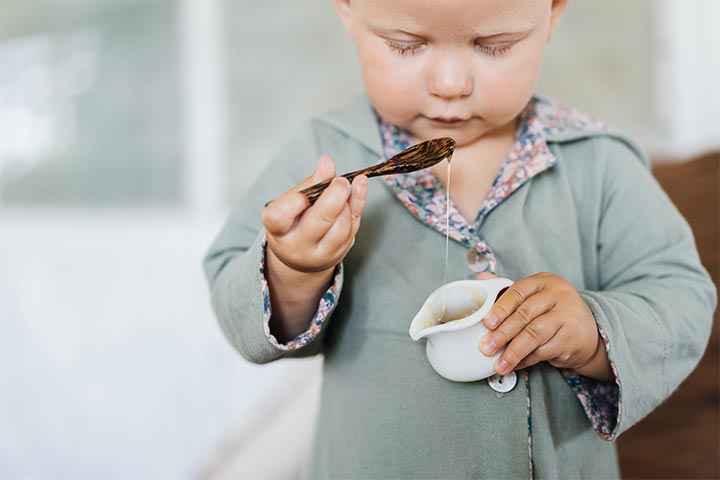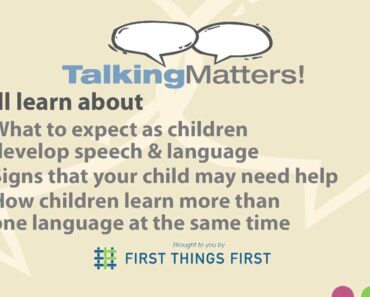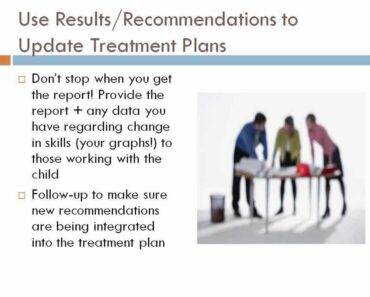Shutterstock
Honey is a natural sweetener well-known for its potential health benefits. Besides, it holds several valuable medicinal properties, making its use prevalent in traditional medicine. People across ages relish honey by adding it to different foods and drinks. However, honey for babies isn’t considered safe. Honey isn’t a common allergen or a potential choking hazard, then why can’t babies have it? If you are a new parent seeking answers to these questions, then read on.
This post tells you why honey is unsafe for babies under 12 months of age, the right time to feed honey to babies, and its potential health benefits.
Why Is Honey Unsafe For Babies Under One Year?
Feeding honey or anything that contains honey to babies younger than one year exposes them to the risk of infant botulism. Infant botulism is a rare but serious illness that occurs when a baby ingests toxin-producing spores of Clostridium botulinum bacteria (1) (2). Botulinum bacteria are naturally found in soil, dust, and certain food items, such as honey (3).
Even a drop of honey could expose the baby’s digestive system to bacterial spores, which may germinate in the gut. The bacteria multiply and produce harmful neurotoxins (4) (5). These neurotoxins (also known as botulinum toxins) can affect nerve functions, resulting in mild to severe symptoms (2) (5).
- Constipation
- Weakened cry
- Poor feeding
- Reduced gag reflex
- Difficulty swallowing and sucking
- Muscle weakness and floppiness
- Drooping eyelids
- Breathing difficulties
- Paralysis
The spores of botulinum bacteria could be present in processed or pasteurized honey. Therefore, you must avoid feeding any type of honey or honey-containing food items to babies under one year of age.
When Can Babies Have Honey?
Healthy babies can consume honey once older than 12 months (1). Healthy toddlers have a mature digestive system that can fend off botulinum bacteria effectively. Hence, they can enjoy honey as part of a well-balanced diet.
You can feed honey to a toddler by adding it to milk or different food items, such as oatmeal and porridge. Alternatively, you can spread it on toast or pancake or add it to yogurt or fresh smoothie.
Nutritional Composition Of Honey
There are hundreds of types of honey, and each has its unique nutritional composition (6). Generally, raw honey contains water, sugar (fructose and glucose), enzymes, amino acids, vitamins, minerals, and bioactive compounds, such as flavonoids and polyphenols (7) (8).
Although the nutritional composition of honey looks appealing, it contains small amounts of vitamins and minerals. Therefore, one has to consume honey in large amounts to reap its benefits (9). However, this isn’t advisable as honey is high in sugar.
Possible Benefits Of Honey For Toddlers
Honey contains sugars, such as fructose and glucose, which add flavor to food and give energy. It contains bioactive compounds that can offer several long-term benefits, such as improved digestion and strengthened immunity (10). Additionally, oligosaccharides in honey act as prebiotics that promote the growth of healthy gut bacteria (11).
Honey is also considered to possess anti-inflammatory, antimicrobial, antiseptic, and antioxidant properties, which may be useful at treating certain conditions, such as wounds, cough, cold, and sore throat (10) (12) (13). If you intend to use honey as a natural remedy, consult an alternative medicine expert. You must use honey for oral and topical use only among babies older than 12 months.
Precautions To Take While Feeding Honey To Toddlers
Here are some safety precautions that can ensure safe honey consumption in toddlers.
- Always prefer raw honey to processed ones as processing removes several vital nutrients and antioxidants from honey.
- Check the ingredient list carefully while purchasing honey. Commercial honey may have added sugar and other ingredients, which may not be healthy for toddlers.
- Introduce honey to your toddler after consulting your pediatrician. Once you get the approval, mix honey in milk or other solid foods, such as porridge, to feed your toddler.
- Begin feeding one-fourth to half a teaspoon of honey initially. Once the toddler adjusts to honey’s taste and digestibility, gradually increase the quantity to a tablespoon.
- Follow a “three to five-day wait” rule and stay vigilant to any signs of allergy or intolerance. Discontinue feeding honey immediately if the baby looks uncomfortable after ingesting it.
- Reintroduce honey in small quantities after some time and observe the toddler’s reaction. In case the toddler still shows signs of discomfort, stop feeding honey and consult a pediatrician.
- Allergy to raw honey is rare but possible (11). The allergic reaction symptoms, such as itchy skin and skin rashes (hives), wheezing, nasal congestion, cough, itching, swelling of the mouth and throat, and abdominal pain, may come up immediately after touching or ingesting honey.
- If your baby has a family history of allergies, especially pollen and bee products, consult your healthcare provider before introducing honey to your toddler. It is essential as pollens and bee products may contaminate honey, triggering an allergic reaction in sensitive individuals (14) (15).
- Although honey is a better alternative to white sugar, its judicious use is vital. Overfeeding honey to toddlers may cause dental caries and unwanted weight gain due to its high sugar content.
- Don’t use honey to improve seasonal allergies. No clinical evidence exists to support this use. On the contrary, feeding raw honey may sometimes be risky due to its potential to cause an immediate allergic reaction due to its pollen content (16).
Raw honey is a healthy sweetener that can offer long-term benefits to toddlers when consumed in moderation. Besides, you can mix it with a few kitchen ingredients and use it as a natural remedy for treating/managing conditions, such as cough and sore throat. Observe precautionary measures while serving honey and let your little one enjoy its goodness.


































